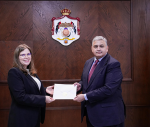You are here
Unlocking AI’s potential for all
Sep 29,2024 - Last updated at Sep 29,2024
NEW YORK — Like the steam engine and electricity, artificial intelligence (AI) is a transformative, foundational technology. If developed to its full potential, AI can create opportunities for people around the world, enable businesses, small and large, power economic growth, advance science and help humanity make significant strides towards achieving the United Nations Sustainable Development Goals (SDGs).
But realising AI’s potential requires addressing the risks, complexities and inequities that currently limit access to its benefits. First, we must rethink our approaches to global cooperation and governance. Nowadays, too many countries are left out of key policy discussions. Notably, as we show in a new report, a sample of major non-UN international AI governance efforts found that only seven countries have participated in every one, while 118 countries, primarily in the Global South, have not been included. The international community can and must do better.
Over the past year, we have co-chaired the UN secretary general’s High-level Advisory Body on AI, a group of 39 individuals from government, civil society, the private sector and academia representing a wide range of regions, genders, age groups and disciplines. Together, we developed a set of principles and recommendations for international AI governance, aiming to ensure that the technology serves the public interest by grounding it in human rights and international law. To engage diverse perspectives and voices, we involved more than 2,000 participants from every region, consulted more than 1,000 experts, reviewed 250 written submissions, and held more than 100 virtual discussions.
As we explain our report, we believe this moment presents a unique opportunity for the international community to lay the foundation to harness the potential from AI, address key governance shortcomings and capacity gaps in its development, deployment and use, and enable a more equitable AI ecosystem. To this end, our report offers seven concrete recommendations for fostering global cooperation, closing governance gaps and creating new mechanisms to enable all countries to benefit from advances in the technology.
AI’s technical and social trajectory remains the subject of fierce debate, even among experts. This makes sense, given that AI is still in its early stages, with its capabilities, applications, and uses evolving rapidly. But uncertainty should not lead to inaction. Instead, it underscores the need for adaptable guardrails that can evolve with the technology and our understanding of it.
Governance efforts must therefore be rooted in both technical expertise and global perspectives. With this in mind, our first recommendation is to establish a truly international scientific panel on AI, bringing together experts from diverse disciplines and backgrounds.
This panel would work with global organisations and initiatives to collect, analyse and promote research, and would publish an annual report on AI-related capabilities, opportunities, risks and uncertainties. By highlighting areas of agreement and identifying topics that require further study, the report could enhance transparency and inform policy debates and decision-making. The panel could also conduct focused investigations into specific issues, such as how AI could be used to discover new materials or treat neglected diseases.
In addition to knowledge-sharing, many countries need better access to essential AI resources like computational power, inclusive and representative training datasets, skilled talent, and a global data framework. To this end, we recommend establishing a global AI fund to support data sharing, build digital infrastructure, nurture local AI ecosystems, and foster entrepreneurship.
We also propose creating an AI capacity-development network to expand global access to talent and expertise and make progress toward the SDGs. To ensure standardization, regulatory alignment, and coordinated approaches to ethics and safety, we recommend establishing an AI standards exchange and an inclusive policy forum for discussions about AI governance. These initiatives would build on the work of UN agencies and other international efforts, promoting interoperability and cross-border collaboration.
Effective coordination will be vital. To achieve this, we propose establishing a small, agile AI office reporting directly to the UN Secretary-General. This office would act as a central hub, connecting and integrating various institutional initiatives. By linking efforts led by regional organizations and other stakeholders, it could reduce the costs of cooperation and streamline collective action.
Putting these institutional structures in place can pave the way for a more inclusive approach to AI governance. This is crucial to preventing the emergence of an “AI divide”, to expanding global access to education and healthcare, and to unlocking the full potential of emerging technologies.
While it is critical to guard against AI’s potential harms and misuses, it is just as important to seize the opportunities the technology creates to achieve the SDGs, drive scientific breakthroughs, and fuel economic growth. Realizing these benefits will require building trust, improving communication, and expanding capacity across many sectors — areas where the UN is uniquely positioned to facilitate cooperation. We hope our report triggers an urgent global conversation about how AI can help create a more sustainable and inclusive future for all.
Carme Artigas, former secretary of state for digitalisation and artificial intelligence of Spain, is co-chair of the UN High-level Advisory Body on Artificial Intelligence. James Manyika, president for Research, Technology, and Society at Google and Alphabet, is co-chair of the UN High-level Advisory Body on Artificial Intelligence













Add new comment